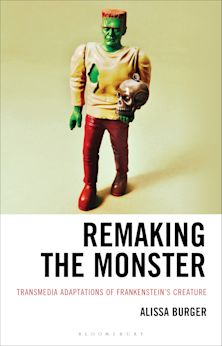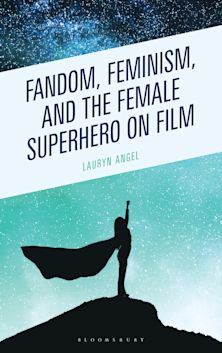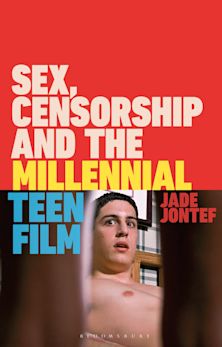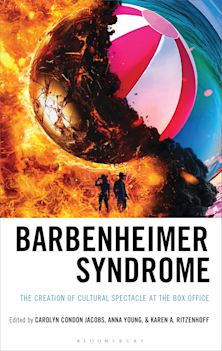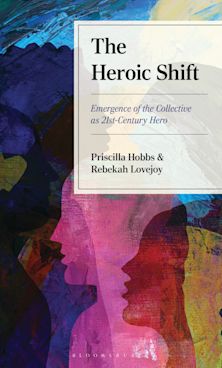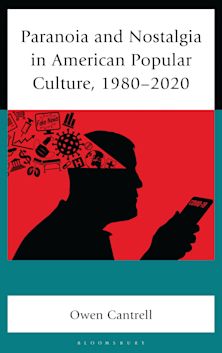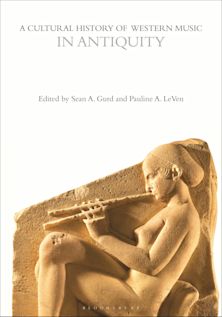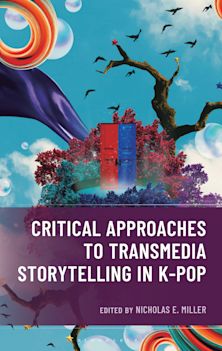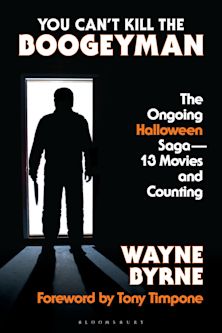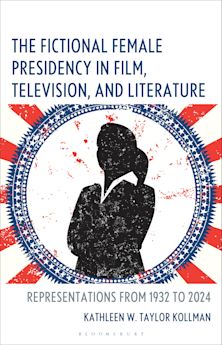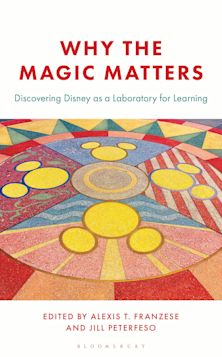- Home
- ACADEMIC
- Film & Media
- Popular Culture
- Fear, Cultural Anxiety, and Transformation
Fear, Cultural Anxiety, and Transformation
Horror, Science Fiction, and Fantasy Films Remade
Scott A. Lukas (Anthology Editor) , John Marmysz (Anthology Editor) , Shane Borrowman (Contributor) , Costas Constandinides (Contributor) , Daryl G. Frazetti (Contributor) , Daniel Herbert (Contributor) , Ils Huygens (Contributor) , Stan Jones (Contributor) , Zilia Papp (Contributor) , Myoungsook Park (Contributor) , Juneko J. Robinson (Contributor) , Constantine Verevis (Contributor)
Fear, Cultural Anxiety, and Transformation
Horror, Science Fiction, and Fantasy Films Remade
Scott A. Lukas (Anthology Editor) , John Marmysz (Anthology Editor) , Shane Borrowman (Contributor) , Costas Constandinides (Contributor) , Daryl G. Frazetti (Contributor) , Daniel Herbert (Contributor) , Ils Huygens (Contributor) , Stan Jones (Contributor) , Zilia Papp (Contributor) , Myoungsook Park (Contributor) , Juneko J. Robinson (Contributor) , Constantine Verevis (Contributor)
You must sign in to add this item to your wishlist. Please sign in or create an account
Description
This collection was inspired by the observation that film remakes offer us the opportunity to revisit important issues, stories, themes, and topics in a manner that is especially relevant and meaningful to contemporary audiences. Like mythic stories that are told again and again in differing ways, film remakes present us with updated perspectives on timeless ideas. While some remakes succeed and others fail aesthetically, they always say something about the culture in which-and for which-they are produced.
Contributors explore the ways in which the fears of death, loss of self, and bodily violence have been expressed and then reinterpreted in such films and remakes as Invasion of the Body Snatchers, Night of the Living Dead, and Dawn of the Dead. Films such as Rollerball, The Ring, The Grudge, The Great Yokai Wars, and Insomnia are discussed as well because of their ability to give voice to collective anxieties concerning cultural change, nihilism, and globalization. While opening on a note that emphasizes the compulsion of filmmakers to revisit issues concerning fear and anxiety, this collection ends by using films like Solaris, King Kong, Star Trek, Doom, and Van Helsing to suggest that repeated confrontation with these issues allows the opportunity for creative and positive transformation.
Table of Contents
2 Acknowledgments
Chapter 3 1. Horror, Science Fiction, and Fantasy Films Remade
Part 4 I. Fear
Chapter 5 2. Immanent Attack: An Existential Take on The Invasion of the Body Snatchers Films
Chapter 6 3. Invasions of Fear: The Body Snatcher Theme
Chapter 7 4. Remaking Romero
Part 8 II. Cultural Anxiety
Chapter 9 5. Cultural Change and Nihilism in the Rollerball Films
Chapter 10 6. Hollywood's Remake Practices under the Copyright Regime: French Films and Japanese Horror Films
Chapter 11 7. Monsters Reappearing in Great Yôkai Wars, 1968-2005
Chapter 12 8. Trading Spaces: Transnational Dislocations in Insomnia/Insomnia and Ju-on/The Grudge
Part 13 III. Transformation
Chapter 14 9. Second Chance: Remaking Solaris
Chapter 15 10. Ape Redux: King Kong and the Kiwis
Chapter 16 11. Distinct Identites of Star Trek Fan Film Remakes
Chapter 17 12. Horror Video Game Remakes and the Question of Medium: Remaking Doom, Silent Hill, and Resident Evil
Chapter 18 13. Film Remake or Film Adaptation?: New Media Hollywood and the Digitizing of Gothic Monsters in Van Helsing
19 Selected Bibliography
20 Index
21 About the Contributors
Product details
| Published | 22 Jun 2010 |
|---|---|
| Format | Ebook (Epub & Mobi) |
| Edition | 1st |
| Extent | 310 |
| ISBN | 9781461633433 |
| Imprint | Lexington Books |
| Publisher | Bloomsbury Publishing |
About the contributors
Reviews
-
If horror is really about the return of the repressed, then the thought of infinite repetition is the most frightening of all: the stifling security in the knowledge that nothing will ever change. This book, thanks to the insight and intelligence of Lukas and Marmysz, shows how one additional repetition-the remake-can have the power to break the spell and carve out a space for genuine innovation in a world of perpetual sameness. This is a crucial text for anyone interest in popular culture and genre film, but it is, even more importantly, a perspicacious anatomy of what terrifies us the most.
Russell A. Berman, Walter A. Haas Professor in the Humanities, Stanford University, and editor, Telos
-
Scott Lukas and John Marmysz have assembled a series of reflections on the multiplied meanings that films accrue when they are remade, and how science fiction and horror remakes in particular disclose shifts in the objects of cultural dread. These essays explore questions of originality, imitation, appropriation, and irony. This collection will be illuminating for students of video, film, and popular culture, and also for those interested in some of the oldest questions posed by philosophy about appearance, reality, and the artistic exploration of strong emotions.
Carolyn Korsmeyer, State University of New York-Buffalo
-
As enlightening as it is eclectic, this collection puts a fresh spin on the idea of the movie re-make, viewing it as much more than an act of derivative imitation or formulaic repetition. Focusing on horror, sci fi, and fantasy films ranging from Rollerball and Solaris to Insomnia and King Kong, the authors highlight the ways in which original movie contents are narratively as well as stylistically re-envisioned. And if we do live nowadays as if in a cave of images upon images, this book teaches us that representations which point directly to other representations may indeed tell us something about our world.
Kevin L. Stoehr, Boston University
-
The phenomenon of the remake gets the intellectual attention it deserves, in a series of essays that mobilize everything from the compulsion to repeat in Freud to the impact of nihilism on a subsequent version of the same story. A thoughtful collection that helps us appreciate the importance of noting the differences between an original and its remake in understanding the meaning of both.
Daniel Shaw, Lock Haven University, managing editor of Film and Philosophy












